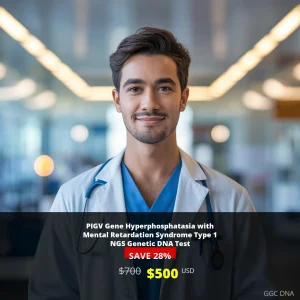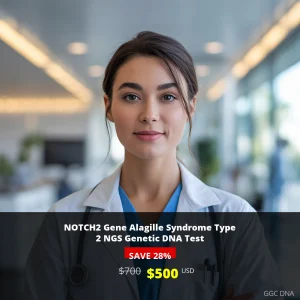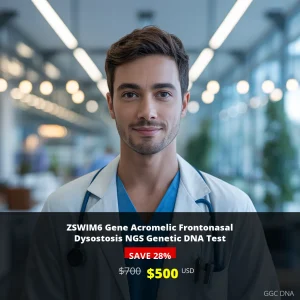Paternal UPD Chromosome 14 Gene Kagami-Ogata Syndrome NGS Genetic DNA Test
Understanding Paternal UPD Chromosome 14 and Kagami-Ogata Syndrome
Paternal Uniparental Disomy (UPD) of chromosome 14 is a rare genetic condition that occurs when an individual inherits both copies of chromosome 14 from their father, rather than one copy from each parent. This abnormal inheritance pattern disrupts normal genetic regulation and leads to Kagami-Ogata syndrome, a complex developmental disorder characterized by distinctive physical features, growth abnormalities, and developmental delays.
Our advanced NGS Genetic DNA Test provides comprehensive analysis to detect this specific genetic abnormality, offering families and healthcare providers definitive diagnostic answers. Early detection through this specialized testing enables timely intervention and personalized management strategies for affected individuals.
What This Test Measures and Detects
This sophisticated genetic test utilizes Next-Generation Sequencing (NGS) technology to specifically identify:
- Paternal uniparental disomy of chromosome 14
- Abnormal methylation patterns in the 14q32.2 imprinted region
- Genetic markers associated with Kagami-Ogata syndrome
- Parent-of-origin inheritance patterns for chromosome 14
The test examines critical imprinted genes on chromosome 14, including DLK1 and MEG3, which play essential roles in normal growth and development. When both copies are inherited from the father, these genes become dysregulated, leading to the characteristic features of Kagami-Ogata syndrome.
Who Should Consider This Genetic Test
Clinical Indications and Symptoms
This test is recommended for individuals presenting with:
- Neonates and infants with distinctive facial features including prominent forehead, depressed nasal bridge, and small chin
- Children experiencing developmental delays in motor skills and speech
- Individuals with growth abnormalities including prenatal and postnatal growth restriction
- Patients with feeding difficulties and respiratory problems in infancy
- Children displaying intellectual disability or learning challenges
- Individuals with abnormal muscle tone (hypotonia)
- Patients with skeletal abnormalities or joint limitations
Family History Considerations
Genetic testing may be particularly important for families with:
- Previous children with unexplained developmental disorders
- Family history of genetic conditions affecting chromosome 14
- Consanguineous parent relationships
- Unexplained pregnancy losses or stillbirths
Benefits of Paternal UPD Chromosome 14 Testing
Undergoing this specialized genetic test provides numerous advantages for patients and families:
Accurate Diagnosis and Prognosis
- Provides definitive diagnosis for unexplained developmental concerns
- Enables accurate prognosis and expectation management
- Helps differentiate from other genetic syndromes with similar presentations
- Provides clarity for future family planning decisions
Personalized Medical Management
- Guides appropriate medical surveillance and screening protocols
- Informs targeted therapeutic interventions and rehabilitation strategies
- Helps coordinate multidisciplinary care involving genetics, pediatrics, and developmental specialists
- Supports early intervention services for optimal developmental outcomes
Family Support and Counseling
- Provides recurrence risk information for future pregnancies
- Enables access to syndrome-specific support groups and resources
- Facilitates genetic counseling for extended family members
- Reduces diagnostic uncertainty and associated stress
Understanding Your Test Results
Positive Result Interpretation
A positive result indicating paternal UPD chromosome 14 confirms the diagnosis of Kagami-Ogata syndrome. This finding provides:
- Definitive explanation for observed clinical features
- Guidance for appropriate medical management and surveillance
- Information about recurrence risks for future pregnancies
- Access to syndrome-specific resources and support networks
Negative Result Interpretation
A negative result excludes paternal UPD chromosome 14 as the cause of symptoms, which:
- Directs further diagnostic evaluation toward other potential causes
- Helps narrow the differential diagnosis
- Provides reassurance regarding recurrence risks for this specific condition
- Guides consideration of alternative genetic testing approaches
Genetic Counseling Follow-up
All test results should be reviewed with a qualified genetic counselor who can:
- Explain the clinical implications of the findings
- Discuss management recommendations and surveillance protocols
- Address family planning considerations
- Provide emotional support and connect families with appropriate resources
Test Information and Pricing
| Test Component | Details |
|---|---|
| Test Name | Paternal UPD Chromosome 14 Gene Kagami-Ogata Syndrome NGS Genetic DNA Test |
| Discount Price | $500 USD |
| Regular Price | $700 USD |
| Turnaround Time | 3 to 4 Weeks |
| Sample Type | Blood, Extracted DNA, or One Drop Blood on FTA Card |
| Testing Method | Next-Generation Sequencing (NGS) Technology |
| Specialty | Pediatrics, Genetics |
| Disease Category | Dysmorphology |
Pre-Test Requirements and Preparation
To ensure accurate testing and comprehensive results, please provide:
- Complete clinical history of the patient undergoing testing
- Participation in a genetic counseling session prior to testing
- Detailed pedigree chart documenting family medical history
- Information about affected family members and their symptoms
Nationwide Testing Availability
We proudly serve patients across the United States with convenient testing locations in all major metropolitan areas including:
- New York City and surrounding tri-state area
- Los Angeles and Southern California region
- Chicago and Midwest locations
- Houston, Dallas, and Texas facilities
- Phoenix, Arizona testing centers
- Philadelphia, Boston, Washington DC, and East Coast locations
- San Francisco, Seattle, and West Coast centers
Our network of certified genetic testing facilities ensures consistent, high-quality testing standards and reliable results regardless of location.
Take the Next Step Toward Genetic Clarity
If you or your child are experiencing symptoms suggestive of Kagami-Ogata syndrome or have concerns about developmental abnormalities, our specialized genetic testing can provide the answers you need. Early diagnosis through advanced NGS technology enables timely intervention and personalized care planning.
Book your Paternal UPD Chromosome 14 Genetic DNA Test today by calling our genetic specialists at +1(267) 388-9828 or schedule your appointment online. Our compassionate team is ready to guide you through the testing process and help you understand your results with comprehensive genetic counseling support.
Don’t let uncertainty about genetic conditions delay appropriate care. Take control of your genetic health with definitive testing from America’s leading genetics laboratory.







